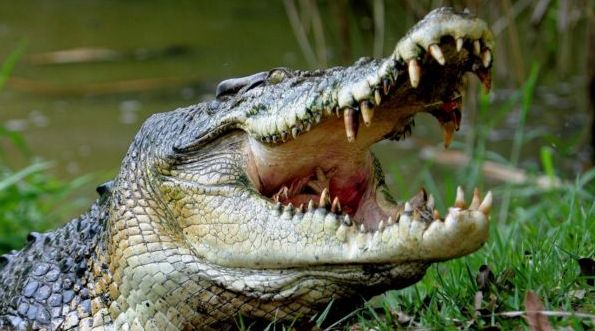Kendrapara: The National Human Rights Commission (NHRC) has sought an Action Taken Report (ATR) from the Principal Chief Conservator of Forests, Odisha, and the District Collectors of Kendrapara and Bhadrak regarding the rising number of deaths and injuries caused by crocodile attacks.
The apex rights body directed the concerned authorities to submit their ATRs, including details of compensation paid to victims’ families, within six weeks in response to the increasing human-crocodile conflicts.
Acting on a petition filed by rights activist Radhakanta Tripathy, the NHRC issued the order last Wednesday. In his petition, Tripathy highlighted that 25 deaths had occurred due to crocodile attacks over the past 29 months. He cited the death of Ajambar Nayak, a buffalo grazer from Ichhapur village in Aul block of Kendrapara district, September 16, 2024.
Nayak was attacked and killed by a crocodile while he was trying to cross a creek with his buffaloes. His remains were later found near the Kharasrota riverbank. The petitioner expressed concern over the escalating number of crocodile attacks, posing a severe threat to the lives and livelihoods of riverside villagers
Crocodiles are frequently spotted in rivers, creeks, and water bodies across several blocks, including Aul, Rajkanika, Pattamundai, Mahakalapara, and Rajnagar in Kendrapara district, as well as Chandbali and Tihidi blocks in Bhadrak district. Tripathy stated that the increasing human-crocodile conflicts are primarily due to a lack of awareness about crocodile habitats and the heavy dependence of villagers on rivers for agriculture, transportation, and daily needs.
This makes them easy prey for crocodiles, especially in sanctuary areas. He alleged that the absence of a proper, unified Standard Operating Procedure (SOP) for managing human-crocodile conflicts has contributed to these incidents. The petitioner urged the authorities to take serious steps, both at the state and Central levels, to mitigate the issue
The rights activist suggested conducting timely research studies to identify the causes of crocodile attacks, vulnerable seasons or times, and mechanisms to allow coexistence between humans and crocodiles. He emphasised the importance of preserving, restoring, and managing natural crocodile habitats such as wetlands and mangroves while creating buffer zones to minimise human-crocodile interactions.
Tripathy further recommended accelerating research on crocodile behaviour, reasons for their migration, and ways to adapt to human presence. Additionally, he urged the NHRC to develop and implement SOPs focusing on prevention, response, and post-incident management by involving local communities, forest officials, and civil society members. Tripathy alleged negligence, inaction, and failure on the part of the Wildlife Department, the Ministry of Environment and Forests, and the state government, which have resulted in the recurring menace, injuries, and fatalities.
He requested the NHRC to conduct a detailed investigation into these incidents through a team of officials, compile an updated database with adequate research, ensure compensation and rehabilitation for victims’ families, and formulate an action plan to prevent such occurrences in the future.
PNN & Agencies
